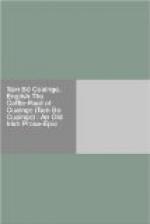Then the maiden looked for it; and Medb said: ’O Fedelm the prophetess, how seest thou the host?’
Fedelm answered and said: ‘I see very red, I see red.’
‘That is not true,’ said Medb; ’for Conchobar is in his sickness at Emain and the Ulstermen with him, with all the best [Note: Conjectural; some letters missing. For the Ulster sickness, see Introduction.] of their warriors; and my messengers have come and brought me tidings thence.
‘Fedelm the prophetess, how seest thou our host?’ said Medb.
‘I see red,’ said the maiden.
‘That is not true,’ said Medb; ’for Celtchar Mac Uithichair is in Dun Lethglaise, and a third of the Ulstermen with him; and Fergus, son of Roich, son of Eochaid, is here with us, in exile, and a cantred with him.
‘Fedelm the prophetess, how seest thou our host?’ said Medb.
‘I see very red, I see red,’ said the maiden.
‘That matters not,’ said Medb; ’for there are mutual angers, and quarrels, and wounds very red in every host and in every assembly of a great army. Look again for us then, and tell us the truth.
‘Fedelm the prophetess, how seest thou our host?’
‘I see very red, I see red,’ said Fedelm.
’I see a fair man who
will make play
With a number of wounds(?) on his girdle;
[Note: Unless this is an allusion to the custom
of carrying an enemy’s head at the girdle, the
meaning is obscure. LL has quite a different
reading. The language of this poem is late.]
A hero’s flame over his head,
His forehead a meeting-place of victory.
’There are seven gems of a hero of valour
In the middle of his two irises;
There is —— on his cloak,
He wears a red clasped tunic.
’He has a face that is
noble,
Which causes amazement to women.
A young man who is fair of hue
Comes ——
[Note: Five syllables missing.]
’Like is the nature of his valour
To Cuchulainn of Murthemne.
I do not know whose is the Hound
Of Culann, whose fame is the fairest.
But I know that it is thus
That the host is very red from him.
’I see a great man on the plain
He gives battle to the hosts;
Four little swords of feats
There are in each of his two hands.
’Two Gae-bolga,
he carries them,
[Note: The Gae-bolga was a special kind of spear,
which only Cuchulainn could use.]
Besides an ivory-hilted sword and spear;
—— [Note: Three syllables
missing] he wields to the host;
Different is the deed for which each arm
goes from him.
’A man in a battle-girdle
(?), of a red cloak,
He puts —— every plain.
He smites them, over left chariot wheel (?);
The Riastartha wounds them.
[Note: The Riastartha (’distorted one’)
was a name given to Cuchulainn because of the contortion,
described later, which came over him.]
The form that appeared to me on him hitherto,
I see that his form has been changed.




